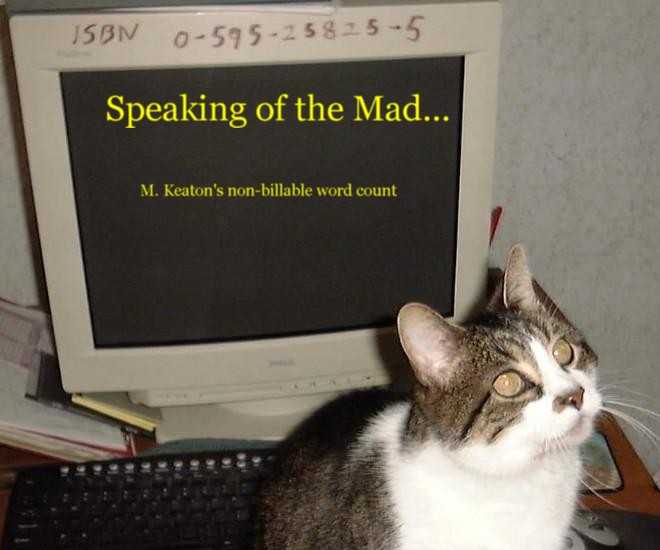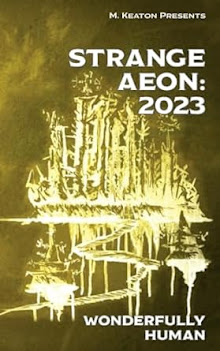I haven’t had a chance to do quality book reviews for a couple of recent books that I really liked but I don’t want them to be overlooked either. Instead, let me give you a quick capsule look at some books that really impressed me.
The Dream of Perpetual Motion by Dexter Palmer
The book is classified as steampunk and one of the cover blurbs calls it “steampunk comes of age”. The statement is fair as far as it goes but I think this is one of those books that transcends simple classification and is simply good literature. Think Fitzgerald’s The Great Gatsby with steampunk trappings retelling Shakespeare’s The Tempest and you’ve got a thumbnail view of the book. This is one of those books that I finished and said, “I can’t write like that. That was art with the capital A.” I’m not sure if it’s fair to say I enjoyed it as much as I was very impressed with it (it’s a grim book so it’s kind of hard to enjoy per se). I do think that if you are a fan of or writer of the steampunk genre, you should make the time to read this book.
The Monstrumologist by Rick Yancy
I like monster horror so this book was right up my alley—monster horror in Victorian era America. Even more impressive was that this book was scary and let’s be honest, not much that is classified as horror is scary these days except for psychological horror (which is too scary but in a different way). This book I enjoyed immensely although I have one small quibble. It’s classified as a YA book. I think it’s a bit too gory for that but that’s where you’ll probably find the book in your library. Good monster ecology in this book adds a great extra level of realism as well. Definitely a good read.
Thursday, November 4, 2010
Monday, November 1, 2010
Non-Fiction Writing and Marketing
I was asked during the convention how one went about writing and marketing non-fiction. I’m not the best person to ask; I’ve done a goodly bit of non-fiction writing in my time but the market changes rapidly and most of what I have done has been very focused, technical non-fiction as opposed to commercial non-fiction. (My beloved child bride that I stole away from the foreign tribes has been after me to write commercial non-fiction for years but I still resist.) Ne’ertheless, I promised to see what I could put together by way of suggestions and references.
Compared to fiction, non-fiction is all good news. The pay is better, the markets are more abundant, and there are plenty of books in most libraries. I don’t think the libraries planned to emphasize non-fiction in their selection of books on writing and formatting; it just happens that most people who write those books freely mix fiction and non-fiction information, and non-fiction is easier to talk about in generalities. So, stop number one: local library and you should be able to find a good stock of books on format, style, etc. The internet is also full of references (search terms like “writing non-fiction”, “formatting non-fiction”, “non-fiction footnote endnotes”, etc.) Also take this time to research your competition. See what’s already on the shelves and who is publishing what you want to write.
This information will give you a general over-view of the different techniques used in non-fiction. What it will not do is tell you what to write, give you markets, or put it all together and tell you what to write and how to write it for a specific market. That is your responsibility.
First off, decide what you want to write and, more importantly in non-fiction, what you are qualified to write about. Qualifications are important to a lot of non-fiction publishers; no degree or special experience, no reason for them to trust your information to be complete or accurate. Whether it’s fair or not, that seems to be the general trend. (On the other hand, some areas are relatively generic but I’m not going to get distracted talking about women’s magazines and that content.) The key thing you’ll want to think about is: Why you? What makes you uniquely qualified to write about this subject and makes your work better and distinct from all the other people who are also writing about it? Sometimes that means saying, “I have a doctorate in theoretical nuclear chemistry” and sometimes it means saying, “I can write about Cleveland because I have lived here for fifty years and seen the changes over time” but you should always be able to answer that questions. (In some cases, the answer might even be, “I think this subject is fascinating so I’ve researched it to death and I have a real passion for it.” That’s a good answer too although it might be a bit harder to sell.)
Having decided what to write, when do you write it? In fiction, unless you’re established as a writer, everything you do will be on speculation (i.e. total freelance). Non-fiction is not always that way. Non-fiction buys a lot of things on query. What order you do things in is up to you and your market but my suggestion would be to at least write a complete draft first. You may have to do a complete rewrite to fit the style guide of a specific publication later but that kind of thing is a lot easier than sitting down and writing cold. (My lovely wife disagrees and advises to query first. If you’re a regular reader, you already know whose advice counts for more.)
In fiction, the cover letter is almost irrelevant to a submission; in non-fiction, it is the main selling point. One of the things you should have picked up from the how-to books is how to write a cover letter and query for non-fiction. I know it seems out of order, but I would suggest that you should be able to put your proposal into a query (or abstract) before you even start looking for markets. Otherwise, you may not have a clear enough grasp of what you’re selling to place it effectively.
Finally, markets. I put this off until last because it’s a big subject but it is not necessarily the last thing you want to consider. You might want to look at markets first to get a feel for what is out there and then go back to actually writing the article or book. Like with query letters, I’m not much help here; this isn’t my area and everyone works differently. But I can tell you that if you’re interested enough in a non-fiction topic to want to write it then you probably have books and magazines about it already handy around the house. Some magazines include a thumbnail of their submission guidelines. Most don’t but will, in turn, have them on the publisher’s website. If not there, then you can search the internet for terms like “non-fiction market listings” or “Magazine name submission guidelines”. The be-all end-all of market listings for everything is the LMP, the Literary Market Place. Your library should have one. (If they don’t, they should be able to get it for you through inter-library loan. If no place in your library system has it, then yell at the thieving buggers and tell them to stop wasting your tax money on bloody paranormal romance and cookbooks and provide the blasted service they were created for. Feel free to add your own expletives as seems appropriate.) The reason I insist on getting access to the LMP through your library is that it is expensive and you need an up-to-date copy. Once you’ve got the LMP in hand, you can find almost any market for any thing. Tailor your query (or full submission) to the publisher’s guidelines and good luck to you.
As an afterward, let me mention corporate work and work-for-hire. This is when a company hires you to write stuff for them, anything from the employee handbook to a company newsletter to the operating manual for their software. You may hear people who write this kind of thing called “technical writers” and, for this kind of work, you need to deal with the company directly since you are basically saying, “Here am I, a writer. Pay me and tell me what to write.” You get this kind of work much like you do any other job: convince the person hiring that you’re the one for them, and then work from their specs with their people. Usually, they will want a local person or someone already affiliated in some way with the company. It’s not glamorous but it’s good work (and better pay) if you can get it.
Some key references:
The Literary Market Place
Writing for Dollars by John McCollister
The Thorncroft Learning Center Workshop: The Business of Writing (I believe one of these workshops is due to be held in Missouri sometime around the end of November.)
Compared to fiction, non-fiction is all good news. The pay is better, the markets are more abundant, and there are plenty of books in most libraries. I don’t think the libraries planned to emphasize non-fiction in their selection of books on writing and formatting; it just happens that most people who write those books freely mix fiction and non-fiction information, and non-fiction is easier to talk about in generalities. So, stop number one: local library and you should be able to find a good stock of books on format, style, etc. The internet is also full of references (search terms like “writing non-fiction”, “formatting non-fiction”, “non-fiction footnote endnotes”, etc.) Also take this time to research your competition. See what’s already on the shelves and who is publishing what you want to write.
This information will give you a general over-view of the different techniques used in non-fiction. What it will not do is tell you what to write, give you markets, or put it all together and tell you what to write and how to write it for a specific market. That is your responsibility.
First off, decide what you want to write and, more importantly in non-fiction, what you are qualified to write about. Qualifications are important to a lot of non-fiction publishers; no degree or special experience, no reason for them to trust your information to be complete or accurate. Whether it’s fair or not, that seems to be the general trend. (On the other hand, some areas are relatively generic but I’m not going to get distracted talking about women’s magazines and that content.) The key thing you’ll want to think about is: Why you? What makes you uniquely qualified to write about this subject and makes your work better and distinct from all the other people who are also writing about it? Sometimes that means saying, “I have a doctorate in theoretical nuclear chemistry” and sometimes it means saying, “I can write about Cleveland because I have lived here for fifty years and seen the changes over time” but you should always be able to answer that questions. (In some cases, the answer might even be, “I think this subject is fascinating so I’ve researched it to death and I have a real passion for it.” That’s a good answer too although it might be a bit harder to sell.)
Having decided what to write, when do you write it? In fiction, unless you’re established as a writer, everything you do will be on speculation (i.e. total freelance). Non-fiction is not always that way. Non-fiction buys a lot of things on query. What order you do things in is up to you and your market but my suggestion would be to at least write a complete draft first. You may have to do a complete rewrite to fit the style guide of a specific publication later but that kind of thing is a lot easier than sitting down and writing cold. (My lovely wife disagrees and advises to query first. If you’re a regular reader, you already know whose advice counts for more.)
In fiction, the cover letter is almost irrelevant to a submission; in non-fiction, it is the main selling point. One of the things you should have picked up from the how-to books is how to write a cover letter and query for non-fiction. I know it seems out of order, but I would suggest that you should be able to put your proposal into a query (or abstract) before you even start looking for markets. Otherwise, you may not have a clear enough grasp of what you’re selling to place it effectively.
Finally, markets. I put this off until last because it’s a big subject but it is not necessarily the last thing you want to consider. You might want to look at markets first to get a feel for what is out there and then go back to actually writing the article or book. Like with query letters, I’m not much help here; this isn’t my area and everyone works differently. But I can tell you that if you’re interested enough in a non-fiction topic to want to write it then you probably have books and magazines about it already handy around the house. Some magazines include a thumbnail of their submission guidelines. Most don’t but will, in turn, have them on the publisher’s website. If not there, then you can search the internet for terms like “non-fiction market listings” or “Magazine name submission guidelines”. The be-all end-all of market listings for everything is the LMP, the Literary Market Place. Your library should have one. (If they don’t, they should be able to get it for you through inter-library loan. If no place in your library system has it, then yell at the thieving buggers and tell them to stop wasting your tax money on bloody paranormal romance and cookbooks and provide the blasted service they were created for. Feel free to add your own expletives as seems appropriate.) The reason I insist on getting access to the LMP through your library is that it is expensive and you need an up-to-date copy. Once you’ve got the LMP in hand, you can find almost any market for any thing. Tailor your query (or full submission) to the publisher’s guidelines and good luck to you.
As an afterward, let me mention corporate work and work-for-hire. This is when a company hires you to write stuff for them, anything from the employee handbook to a company newsletter to the operating manual for their software. You may hear people who write this kind of thing called “technical writers” and, for this kind of work, you need to deal with the company directly since you are basically saying, “Here am I, a writer. Pay me and tell me what to write.” You get this kind of work much like you do any other job: convince the person hiring that you’re the one for them, and then work from their specs with their people. Usually, they will want a local person or someone already affiliated in some way with the company. It’s not glamorous but it’s good work (and better pay) if you can get it.
Some key references:
The Literary Market Place
Writing for Dollars by John McCollister
The Thorncroft Learning Center Workshop: The Business of Writing (I believe one of these workshops is due to be held in Missouri sometime around the end of November.)
Subscribe to:
Comments (Atom)




















